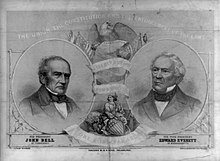Constitutional Union Party (United States)
Party leaders hoped to force a contingent election in the House of Representatives by denying any one candidate a majority in the Electoral College.
Bell declared his support for the Confederacy following the Battle of Fort Sumter, but many other Constitutional Unionists remained loyal to the Union throughout the American Civil War.
[10] Senator John J. Crittenden of Kentucky, Henry Clay's successor in border-state Whiggery, led a group of conservative, unionist congressmen in forming the Constitutional Union Party.
[11] At Crittenden's behest, fifty former and current members of Congress met in Washington, D.C. in December 1859, where they agreed to form a new party dedicated to preserving the union and avoiding debates over slavery.
[18] Constitutional Unionists hoped to deny an electoral vote majority to any one candidate, thereby forcing a contingent election in the House of Representatives.
[21] As a large proportion of the delegates were over the age of sixty, some political opponents derided the Constitutional Unionists as the "Old Gentleman's Party".
During his long career in the Whig Party, Bell had established a reputation as a moderate on the slavery issue, opposing both the Mexican–American War and the Kansas–Nebraska Act.
[23] Houston had served in two wars and had compiled a long political record as a leading member of the Democratic Party, and like Bell he had opposed the Kansas–Nebraska Act.
However, his status as a former protege of Andrew Jackson alienated many of the delegates, and Bell's backers argued that Houston would have little appeal in the North.
[24] Aside from Bell and Houston, other potential candidates for the Constitutional Union presidential nomination included Everett, 1852 Whig nominee Winfield Scott, and Edward Bates of Missouri, who ultimately chose to support the Republican Party.
[27] Seeking to provide sectional balance to the ticket, the convention selected Everett as the party's vice presidential nominee by acclamation.
In the North, Republican nominee Abraham Lincoln faced Douglas, and in the South, the Constitutional Union ticket competed against Breckinridge.
[17] Adhering to precedent, Bell remained at his home during the campaign, but Breckinridge and other party leaders gave numerous speeches.
Towers writes that, "notwithstanding the nuances of local issues in selecting a president, voters could either endorse the compromise vision of the Union by choosing Douglas or Bell, or reject it by opting for Lincoln or Breckinridge.
[17] Constitutional Unionists responded by attacking Breckinridge (who publicly disavowed disunion) as a secessionist who had fallen under the influence of Fire-Eaters like William Lowndes Yancey.
[17] Bell won a plurality of the vote in Tennessee, Kentucky, and Virginia, and finished within five points of Breckinridge or Douglas in North Carolina, Maryland, Missouri, and Louisiana.
[43] Bell finished a distant second to Breckinridge in all of the remaining slave states except South Carolina, which did not hold a popular vote for president.
[51] Crittenden's compromise proved unacceptable to both Northern Republicans and Southern Democrats, and it failed to win approval from the Committee of Thirteen.
[54] On the last day of the 36th United States Congress, both the Crittenden Compromise and the separate plan proposed at the Peace Convention were rejected in the House and the Senate.
Many border state Constitutional Unionists, including John Marshall Harlan, joined Union parties that sprung up during the war.






